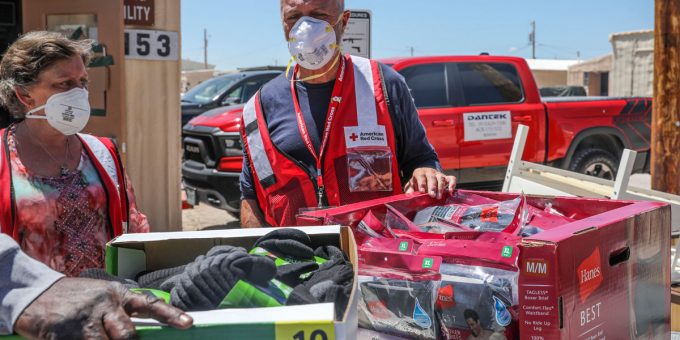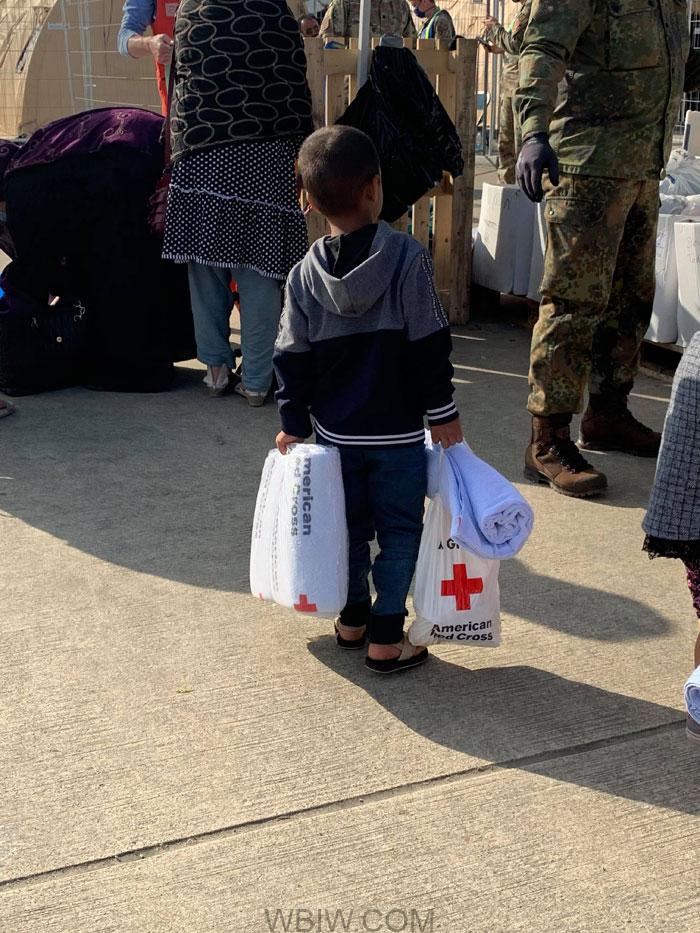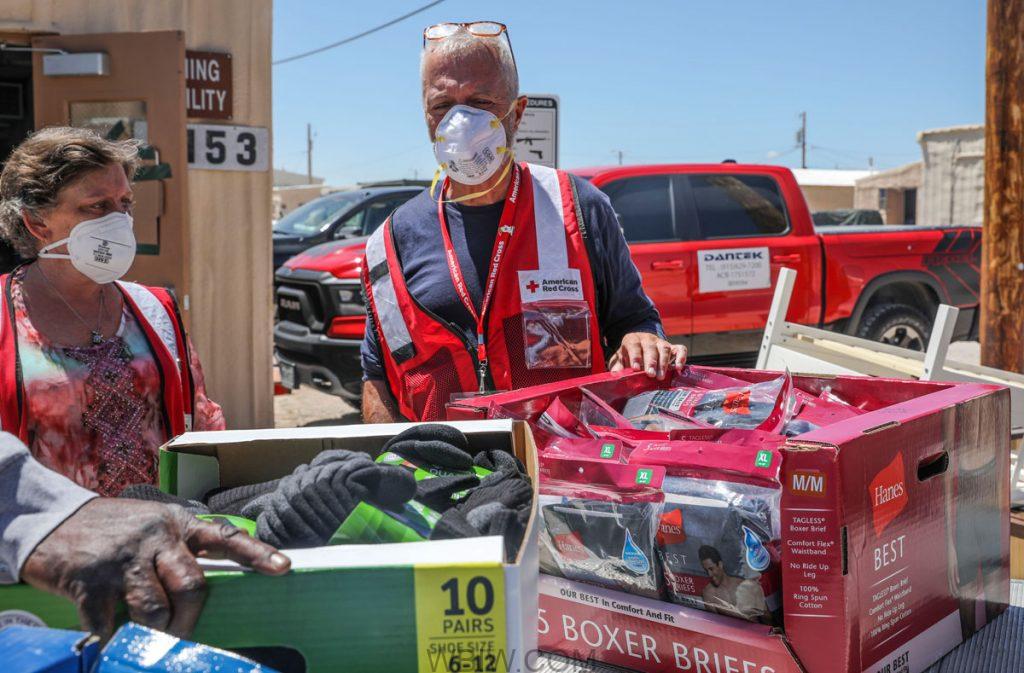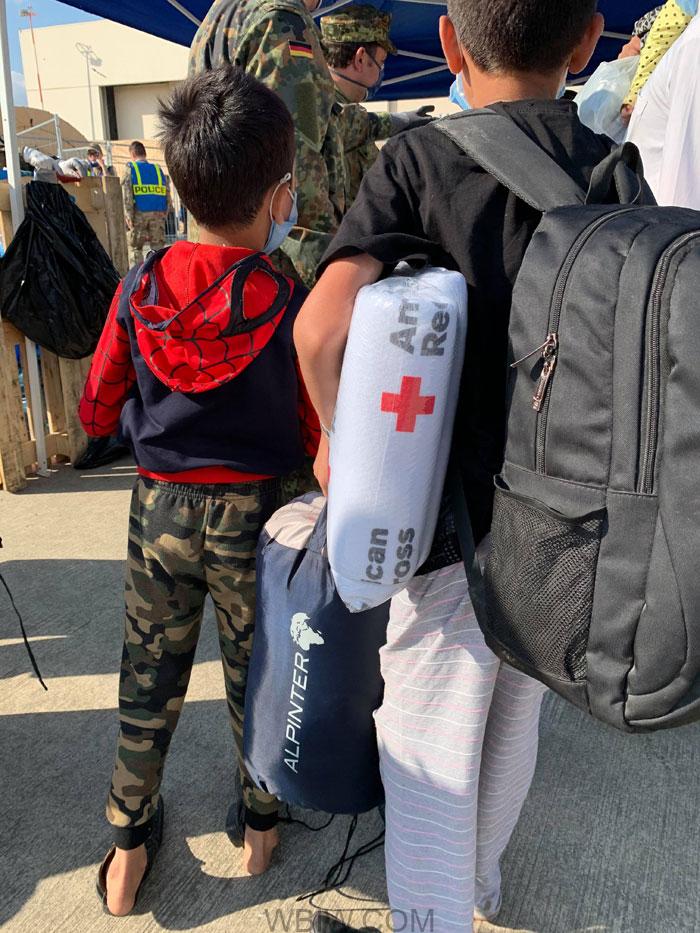
UNDATED – Humanitarian needs in Afghanistan remain high. Conflict, extreme drought, and the COVID-19 pandemic have converged, with thousands of people newly displaced and millions continuing to suffer from unsafe living conditions and acute food shortages.

More than 100,000 people — many of whom are U.S. citizens or who supported U.S. troops over the years — have evacuated Afghanistan over the past few weeks. At the Kabul airport in late August, an attack left scores dead, including children.
As uncertainty in Afghanistan continues, Red Cross and Red Crescent teams are providing humanitarian relief to families inside and outside the country. For its part, the American Red Cross is helping those making their way out of Afghanistan who is in transit and arriving in other countries.
On Military Bases in the U.S. and Abroad: Welcoming Evacuees
The American Red Cross is supporting repatriation and evacuation efforts for thousands of people following the recent unrest in Afghanistan. Families are facing so much uncertainty, so the Red Cross is doing everything it can to provide comfort, care, and a level of normalcy.

Nearly 300 Red Cross volunteers are responding to the needs of U.S. citizens and others who have evacuated Afghanistan. The American Red Cross is temporarily caring for evacuees being sheltered at military bases around the United States, at the request of the Department of Defense (DoD).
Some 125 Red Cross volunteers are onsite at Fort Bliss in Texas, Fort McCoy in Wisconsin, and Joint Base Dix-McGuire-Lakehurst in New Jersey to address evacuees’ basic human needs after their difficult journey to the U.S. Our teams are providing health and mental health services — and making sure people have necessities such as hygiene items, clothing, cribs, diapers, and more. Families left critical items behind in the rush to evacuate, so the Red Cross is helping to replace prescription medications, eyeglasses, canes, wheelchairs, and other basic items.
The Red Cross is also supporting Afghan evacuees and U.S. citizens’ repatriations on U.S. military bases around the globe. American military bases in Germany, Spain, Italy, Bahrain, and Kuwait are receiving and housing travelers on their way to the United States. As evacuees arrive from Afghanistan, Red Cross teams are providing items such as food, water, blankets, toiletries, feminine hygiene products, and baby care items. Professional medical volunteers with the Red Cross are providing first aid.

Overall, the Red Cross has provided some 240,000 items to support evacuees from Afghanistan. This includes nearly 100,000 comfort kits and towels; some 33,000 blankets; more than 24,000 personal protection items such as hand sanitizer, masks, gloves, and thermometers; and 83,000 personal items, including baby bottles, portable cribs, and stuffed animals.
Household goods and clothing donations: While we appreciate the generosity of the American people to offer clothing and other items to Afghan refugees who have recently arrived, the American Red Cross does not have the ability to process or distribute donated items in this way. Please contact local charitable organizations near Fort Bliss, Fort McCoy, and Fort Dix to make donations of clothing and household goods. Refugee resettlement organizations across the United States will need household goods in the weeks and years to come as they help Special Immigrant Visa (SIV) holders and refugees navigate their new lives, so locate a local agency here to donate goods.
We are proud to play a role in welcoming U.S. citizens and Afghan refugees who have been through so much over the past days and years. Many people arriving will know the red cross emblem from their time in Afghanistan. As one of the most widely recognized symbols in the world, people know they can depend on us for help.
The American Red Cross has a long history of supporting humanitarian needs for evacuees and refugees arriving in the U.S. from international conflicts. For example, we helped tens of thousands of Hungarian refugees in 1956 during that country’s revolution. We also supported Cuban refugees starting in 1961 and aided refugees from Vietnam and Cambodia in 1975.
Here’s more information about how the Red Cross typically helps refugees, asylum seekers, and migrants in the U.S.
If you are unable to locate a loved one who has been impacted by the current events in Afghanistan, the Red Cross may be able to reconnect you through our Restoring Family Links program. Mental health support is also available, and we encourage people to reach out to the free 24/7 Disaster Distress Helpline via phone or text at 1-800-985-5990.
In U.S. Military Communities: Aiding U.S. Service Members, Veterans and their Families
The American Red Cross is supporting military families and veterans struggling with the aftermath of recent events in Afghanistan. Caregivers of veterans can reach out to the Military and Veteran Caregiver Network (MVCN), a free, confidential online network that provides resources, emotional support and reduces isolation. Veterans or military families in need of mental wellness support can reach out to their local Red Cross or visit our Reconnection Workshops online to join a free, confidential workshop that can help guide them through military-specific transition and stress.
While the Red Cross does not typically service Walter Reed Medical Center in Maryland, we recently provided additional blood products there to help support any blood needs for troops returning home from Afghanistan.
If you are having thoughts of suicide, please call the Veterans Crisis Line at 1-800-273-8255, then PRESS 1 or visit https://www.veteranscrisisline.net/.
For emergency mental health care, you can also go directly to your local VA medical center 24/7, regardless of your discharge status or enrollment in other VA health care. The VA also has local Vet Centers in your community to help discuss how you feel with other veterans in these community-based counseling centers — some 70% of Vet Center staff are veterans. Call 1-877-927-8387 or find one near you.
In Afghanistan: Humanitarian Aid Continues
The Afghan Red Crescent and the International Committee of the Red Cross (ICRC) have been active in Afghanistan for decades, providing aid such as clean water and medical care.
Currently, one of the worst droughts in decades is crippling food production across the country and nearly one-third of Afghanistan’s population is experiencing high levels of acute food shortages. The Afghan Red Crescent is providing cash grants to families who have lost their livelihoods due to the drought so they can buy food supplies and restore crops.
The ICRC, whose medical teams run physical rehabilitation centers in Afghanistan, treated more than 40,000 people wounded by weapons across 46 ICRC-supported facilities in June, July, and August alone. The ICRC expects to receive patients for months and years to come as they recover from wounds from explosive devices that litter the country, many of them newly laid in recent weeks. Wards are filled with children, young men, and women who have lost limbs and suffered other severe injuries. Since January of this year, the ICRC has provided artificial limb-fitting and physical rehabilitation to nearly 80,000 Afghan citizens. Sadly, for the direst circumstances, ICRC teams are identifying victims, notifying their families, and connecting them with the remains of their loved ones.
“Afghanistan is facing a triple crisis: armed conflicts for decades, consequences of climate change and the COVID-19 crisis,” said Robert Mardini, Director-General of the ICRC. “We will continue to work hand-in-hand with the Afghan Red Crescent Society to help those whose lives have been scarred by war.”
About the American Red Cross:
The American Red Cross shelters, feeds, and provides comfort to victims of disasters; supplies about 40% of the nation’s blood; teaches skills that save lives; distributes international humanitarian aid; and supports veterans, military members, and their families. The Red Cross is a nonprofit organization that depends on volunteers and the generosity of the American public to deliver its mission. For more information, please visit redcross.org or cruzrojaamericana.org, or visit us on Twitter at @RedCross.



